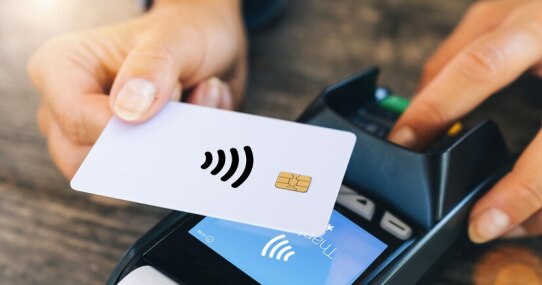Smart Cards: Bridging the Gap Between Security and Convenience Introduction:
Smart cards have revolutionized the way we interact with technology, providing a secure and convenient solution for various applications. This article explores the concept of smart cards, focusing on both contact and contactless technologies, and highlights their significance in today's digital age.
What are Smart Cards?
Smart cards, also known as chip cards or integrated circuit cards, are pocket-sized cards with embedded microchips that store and process data. These cards serve as portable, secure storage devices capable of performing cryptographic functions and facilitating secure communication.
Contact Smart Cards:
Contact smart cards require physical contact with a card reader for data transfer. They feature gold-plated contact pads on the card's surface, which establish a connection with the reader. These cards are commonly used in applications that require higher security levels, such as banking, identification, and access control systems. The contact interface enables a two-way data exchange, allowing for authentication and secure data storage.
Contactless Smart Cards:
Contactless smart cards, on the other hand, use radio frequency identification (RFID) technology for communication. They do not require direct physical contact with a reader, allowing for quick and convenient transactions. Contactless cards are widely used in public transportation systems, payment solutions, and access control applications. They utilize electromagnetic fields to transfer data wirelessly, enhancing user experience and reducing transaction times.
Security Features:
Both contact and contactless smart cards incorporate numerous security features to protect sensitive data. These include encryption algorithms, digital signatures, and secure key storage. These measures ensure that the information stored on the card remains confidential and tamper-resistant. Additionally, smart cards often require the user to enter a PIN or provide biometric authentication, adding an extra layer of security.
Advantages of Smart Cards:
a) Enhanced Security: Smart cards provide a higher level of security compared to traditional magnetic stripe cards. The encryption and authentication mechanisms employed by smart cards help prevent unauthorized access to sensitive information.
b) Convenience: Contactless smart cards offer a seamless and swift user experience. With just a tap, users can complete transactions, access buildings, or board public transportation. The absence of physical contact eliminates the need for swiping or inserting the card, making transactions faster and more efficient.
c) Versatility: Smart cards can store a variety of data, including personal information, financial details, and access credentials. This versatility allows for the integration of multiple applications into a single card, reducing the need to carry multiple cards or devices.
d) Durability: Smart cards are designed to withstand physical wear and tear, making them more durable than traditional cards. The embedded microchip is protected by a sturdy plastic shell, ensuring the card's longevity.
Future Trends:
Smart card technology continues to evolve, adapting to the changing needs of the digital landscape. The integration of biometric authentication, such as fingerprint or facial recognition, is becoming increasingly common, further enhancing security. Additionally, advancements in wireless technology are paving the way for innovative applications of contactless smart cards in areas like healthcare, IoT devices, and secure access control systems.
Conclusion:
Smart cards have become an integral part of our modern lives, offering a secure and convenient solution for a wide range of applications. Whether it's making secure payments, accessing secure facilities, or managing personal information, smart cards bridge the gap between security and convenience. As technology continues to advance, smart cards will undoubtedly play a crucial role in enabling a safer and more connected future.
Smart cards have revolutionized the way we interact with technology, providing a secure and convenient solution for various applications. This article explores the concept of smart cards, focusing on both contact and contactless technologies, and highlights their significance in today's digital age.
What are Smart Cards?
Smart cards, also known as chip cards or integrated circuit cards, are pocket-sized cards with embedded microchips that store and process data. These cards serve as portable, secure storage devices capable of performing cryptographic functions and facilitating secure communication.
Contact Smart Cards:
Contact smart cards require physical contact with a card reader for data transfer. They feature gold-plated contact pads on the card's surface, which establish a connection with the reader. These cards are commonly used in applications that require higher security levels, such as banking, identification, and access control systems. The contact interface enables a two-way data exchange, allowing for authentication and secure data storage.
Contactless Smart Cards:
Contactless smart cards, on the other hand, use radio frequency identification (RFID) technology for communication. They do not require direct physical contact with a reader, allowing for quick and convenient transactions. Contactless cards are widely used in public transportation systems, payment solutions, and access control applications. They utilize electromagnetic fields to transfer data wirelessly, enhancing user experience and reducing transaction times.
Security Features:
Both contact and contactless smart cards incorporate numerous security features to protect sensitive data. These include encryption algorithms, digital signatures, and secure key storage. These measures ensure that the information stored on the card remains confidential and tamper-resistant. Additionally, smart cards often require the user to enter a PIN or provide biometric authentication, adding an extra layer of security.
Advantages of Smart Cards:
a) Enhanced Security: Smart cards provide a higher level of security compared to traditional magnetic stripe cards. The encryption and authentication mechanisms employed by smart cards help prevent unauthorized access to sensitive information.
b) Convenience: Contactless smart cards offer a seamless and swift user experience. With just a tap, users can complete transactions, access buildings, or board public transportation. The absence of physical contact eliminates the need for swiping or inserting the card, making transactions faster and more efficient.
c) Versatility: Smart cards can store a variety of data, including personal information, financial details, and access credentials. This versatility allows for the integration of multiple applications into a single card, reducing the need to carry multiple cards or devices.
d) Durability: Smart cards are designed to withstand physical wear and tear, making them more durable than traditional cards. The embedded microchip is protected by a sturdy plastic shell, ensuring the card's longevity.
Future Trends:
Smart card technology continues to evolve, adapting to the changing needs of the digital landscape. The integration of biometric authentication, such as fingerprint or facial recognition, is becoming increasingly common, further enhancing security. Additionally, advancements in wireless technology are paving the way for innovative applications of contactless smart cards in areas like healthcare, IoT devices, and secure access control systems.
Conclusion:
Smart cards have become an integral part of our modern lives, offering a secure and convenient solution for a wide range of applications. Whether it's making secure payments, accessing secure facilities, or managing personal information, smart cards bridge the gap between security and convenience. As technology continues to advance, smart cards will undoubtedly play a crucial role in enabling a safer and more connected future.


